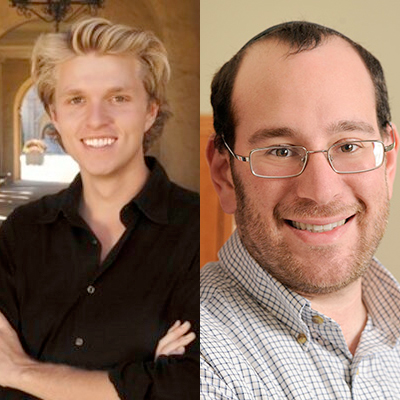We can improve public health with big data
The leading cause of death in the United States isn't disease but the behaviors that lead to a disease—such as, exercise and heart disease, diet and cancer, or vaccination and infection. Therefore, changing behavior and leading a healthy lifestyle can prevent more deaths than any other public health effort. The things we do or don’t do to ourselves can prolong or deteriorate our health. Measuring how behavior impacts our bodies can offer profound insight into how to take care of ourselves better. Drs. John Ayers and Mark Dredze, Assistant Research Professor of Epidemiology at San Diego State University and Assistant Research Professor of Computer Science at Johns Hopkins University, respectively, are building a host of big data tools based on web data to read trends in public health and address a myriad of questions regarding behavioral medicine. By aggregating and analyzing public online data—whether it is on smoking, weight loss routines, or drug use—on a number of platforms like the search engines, social media, and the news media, Drs. Ayers and Dredze are revolutionizing public health by answering new questions that we’ve never been able to ask.
Drs. Ayers and Dredze are internationally recognized leaders in public health and computer science who collaborate with numerous doctors and public health workers. The two of them form a true partnership bridging the cutting-edge in public health thinking and the cutting-edge in computer science methods. They have produced highly respected works across public health, including in cancer control, health economics, health policy, infectious disease, obesity, mental health, tobacco control, etc. Moreover, much of data in public health is private, expensive and hard to access. Drs. Ayers and Dredze bring public data to public health; making data free, accessible, and open for all. They have produced some of the most cited work on the analysis of health-related data, and their complimenting expertise produces a unique perspective that leads to important new public health breakthroughs. For example, the team was the first to assess and discover the rising popularity of electronic cigarettes in 2011. More recently, they have developed systems that harness Internet search queries to predict flu trends, outperforming Google Flu Trends every week during two recent influenza seasons. Working closely with leading investigators across public health and computer science and supervising dozens of postdoctoral residents and doctoral students in the lab, Drs. Ayers and Dredze are leading efforts to harness big data to improve public health.
Current projects include:
- Search Data: What day do more people want to quit smoking? It’s not New Year's Day; it’s Monday, according to a global analysis of Internet search queries. Is there global seasonality across mental illness? Mental illness across nine distinct categories including depression appears to follow clear seasonal patterns that intensifies further from the equator (where the disparity in sunlight from summer to winter is strongest) according to Internet searches for symptomology or treatments. What is the new popular illicit drug? By analyzing the content of peer-to-peer forums, researchers can identify what drugs are popular and what new drugs may be emerging on the market. Probing search queries, therefore, gives us powerful insight into what people are thinking and when they are thinking it by the content of their search. Drs. Ayers and Dredze hope to provide continued public health insight using Internet search query trends.
- Social Media: Why do people use electronic cigarettes? While marketed as a cessation device, more users appear to prefer electronic cigarettes because they come in fun flavors; they are less expensive than traditional cigarettes; and they can be used anywhere, as Drs. Ayers and Dredze discovered by mining Twitter. Mining social media platforms can therefore teach us what people think and how information is shared and forms the norms in populations. Drs. Ayers and Dredze were the first to tackle Twitter to observe the spread of behaviors in public health, and by looking at issues like why people don’t want to vaccinate their children, etc, they can predict the course of an epidemic or understand patterns of behavior.
- News Media: How do we stay on top of changing healthcare policies and a changing public health environment? One way is by monitoring the news, as news is often what shapes the public awareness. Drs. Ayers and Dredze analyze the media to observe changes in the environment, determining the context of the social norms as established by the news media. Searching media in 23 languages that represent a substantial portion of the world population, Drs. Ayers and Dredze are able to scan news articles from around the globe to identify the “next big thing.” Looking at media allows them to look at a thread of information; for example, what new products are emerging in the market and how the context of the public health environment is shaped.
Bio
John W. Ayers is a research professor and behavioral epidemiologist at the San Diego State University. He researches in the field of public health informatics and the use of social media data in detecting behavioral health trends. Trained in both political science and epidemiology, he has published in medical journals including Journal of the American Medical Association, JAMA Internal Medicine, American Journal of Public Health, and American Journal of Preventive Medicine. His research findings have been featured in national and international media sources, including The New York Times, The Washington Post, Los Angeles Times, Time (magazine), and Newsweek.
Mark Dredze is the John C Malone Associate Professor of Computer Science at Johns Hopkins University. He is affiliated with the Applied Physics Laboratories, the Malone Center for Engineering in Healthcare, the Center for Language and Speech Processing, among others. He holds a secondary appointment in the Department of Health Sciences Informatics in the School of Medicine. He obtained his PhD from the University of Pennsylvania in 2009.
Prof. Dredze’s research develops statistical models of language with applications to social media analysis, public health and clinical informatics. Within Natural Language Processing he focuses on statistical methods for information extraction but has considered a wide range of NLP tasks, including syntax, semantics, sentiment and spoke language processing. His work in public health includes tobacco control, vaccination, infectious disease surveillance, mental health, drug use, and gun violence prevention. He also develops new methods for clinical NLP on medical records.
Beyond publications in core areas of computer science, Prof. Dredze has pioneered new applications in public health informatics. He has published widely in health journals including the Journal of the American Medical Association (JAMA), the American Journal of Preventative Medicine (AJPM), Vaccine, and the Journal of the American Medical Informatics Association (JAMIA). His work is regularly covered by major media outlets, including NPR, the New York Times and CNN.
For more information about Prof. Dredze's research, please visit his website: http://www.dredze.com.
In the News
The San Diego Union-Tribune (cover article)
Scientific American
New research shows that people are more health-conscious at the start of each new week, so health advocates are encouraging everyone to harness the psychological power of Mondays.
The CDC is using a social media contest to forecast the spread of the flu. Johns Hopkins professor Mark Dredze tells NPR's Scott Simon that tweets like "Bieber fever" make tracking the flu more difficult.



